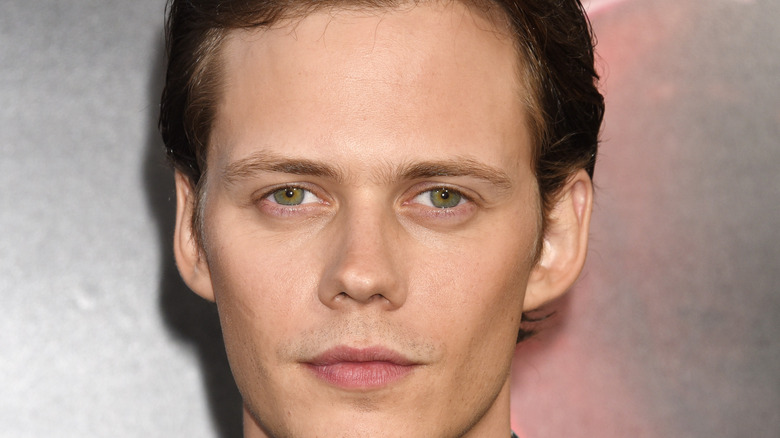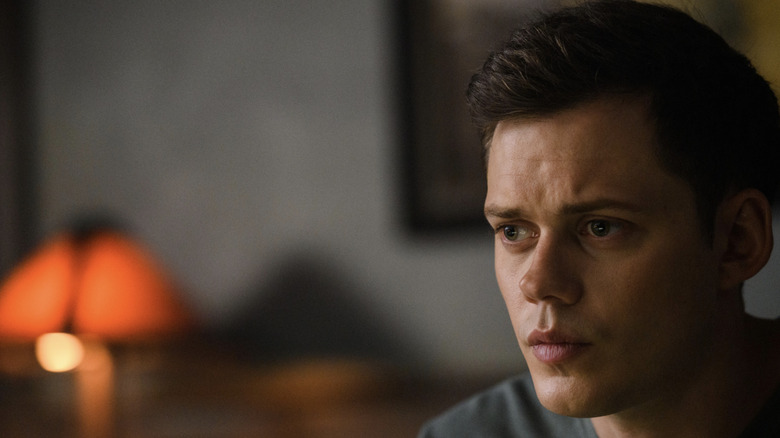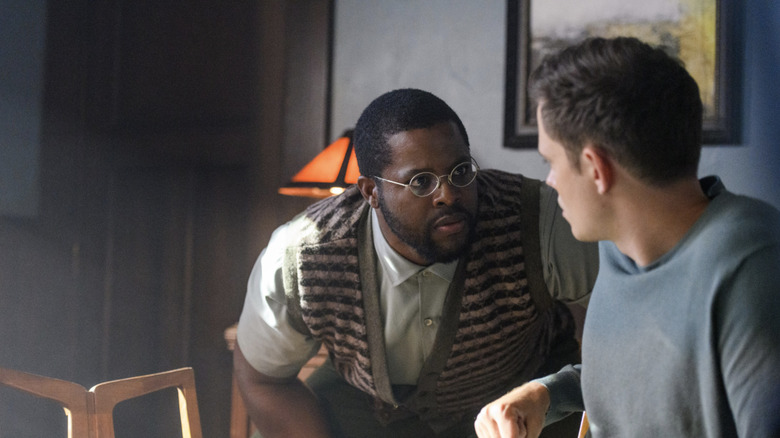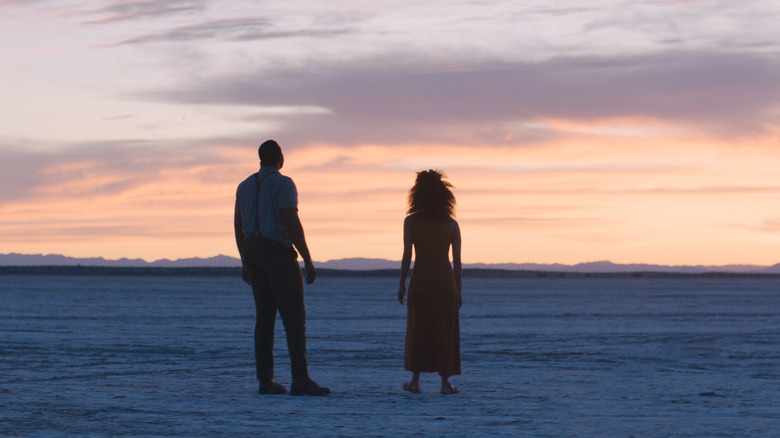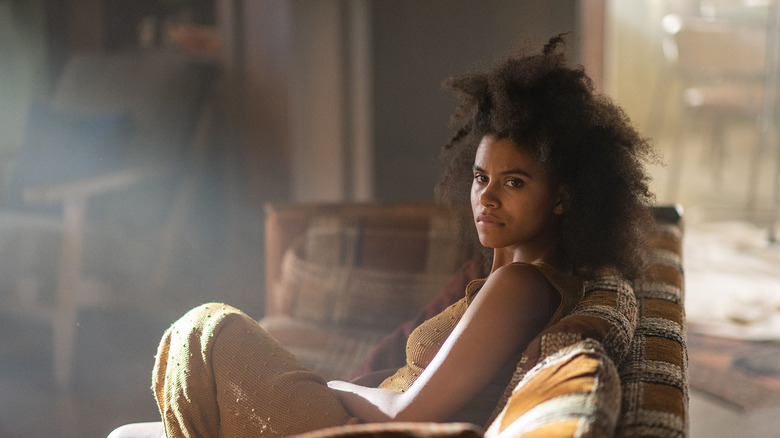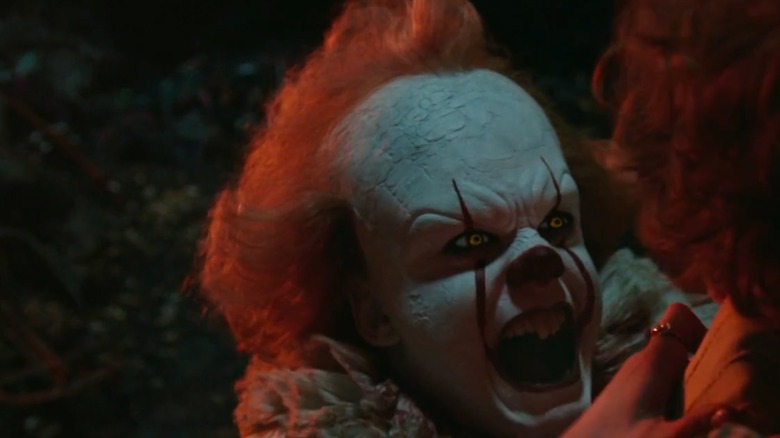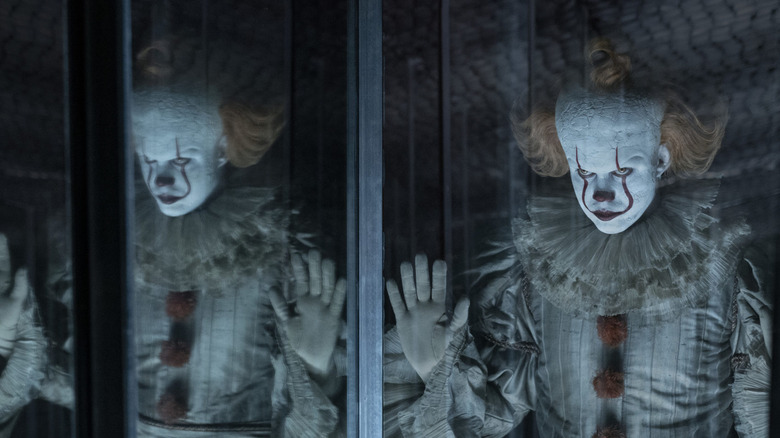Bill Skarsgård Discusses His Moving New Film Nine Days - Exclusive Interview
Throughout his career, Bill Skarsgård has played heavily costumed characters in a number of genre films and TV shows. Most notably, he donned a caked-on smile for his terrifying stint as Pennywise in the 2019 adaptation of "It." But before he headed to Stephen King's Derry to clown around, he played Roman Godfrey in "Hemlock Grove" — and after that, Skarsgård appeared in "Assassination Nation" and "Deadpool 2" before returning to King's world for "Castle Rock" and heading back in time for "The Devil All the Time."
But now, Skarsgård is ditching the heavy costumes for his role as Kane in "Nine Days," alongside Zazie Beetz, Winston Duke, Tony Hale, and Benedict Wong. The film has been a long time coming, with an original release date set for 2020, but it couldn't have arrived at a more relevant time. Diving into the age-old question of "what is the meaning of life," the film sees Skarsgård playing one of several unborn souls competing for the chance to live a life on Earth.
In an exclusive interview, Looper spoke to Bill Skarsgård about "Nine Days" and why the movie stands out against his vast catalog of work. He even took us back to Derry, Maine, to dish on playing the sadistic clown Pennywise in "It."
Changing pace
"Nine Days" is so incredibly thought-provoking. And it's so different and a lot slower than many of your other projects. What were you most excited about accomplishing with the film, and what drew you to your role?
I read the script, and I had a similar reaction. I thought it was an amazing, stimulating script and thought-provoking. And then I met with Edson Oda, our wonderful director, and that conversation kind of just continued.
We went into these sort of philosophical conversations about life and death and this liminal stage between pre-birth and life — and also the fact that our society might value some traits over others. And all of these things that the movie and the script questions, that the story posed. So that was kind of the reason for why I wanted to do it: Edson and this story. It's a very personal story for him and how he's been dealing with losses in his family. And this is a story that's in honor and in memory of his uncle that died by suicide.
If you or someone you know is struggling with mental health, please contact the Crisis Text Line by texting HOME to 741741, call the National Alliance on Mental Illness helpline at 1-800-950-NAMI (6264), or visit the National Institute of Mental Health website.
Ditching the clown costume
And the slower pace, in terms of the challenge for me, it's like any other job. I thought it was really important that what I brought was feeding into Edson's vision of the story and of the world. And that posed a few challenges in the beginning because you could have gone so many different ways about this.
I was like, "Do you want to make like a weird sci-fi performances, where we're all kind of like these souls, but we're performing them like these strange aliens that are foreign to life and foreign to experience?" And he didn't want any of that. So we're like, "Okay, cool." So we need to figure out that all of us, as the sort of candidates for this journey, we're playing it in a similar way. And he wanted a very toned down, naturalistic approach to it, so that it became, for me as an actor in the thing was just like, "What do you want? And let me help you tell this story, with the vision that you want to tell it."
You've done a lot of films with heavy costumes and props. Did you find it easier or more difficult to get into character without having those massive sets and those heavy costumes that sort of define those kinds of roles?
Oh, it's a lot easier: quicker time in the wardrobe chair, which is always a big plus and, and just an altogether more comfortable experience on set. The more makeup and the more costumes that you wear, it just becomes a nuisance at the end of the day. It's fun, and it's fun to explore. But just for the sake of being comfortable on a film set, having sweatpants and a t-shirt and very little makeup made it a lot easier.
Finding the tone
What was the most challenging aspect of filming?
I think the challenge was finding the tone for what Edson wanted, a little bit of what I already mentioned. It was just like, "Okay, what is the world that you want to do you want to create? And how does these non-living souls interact in this world?"
It wasn't hard per se, but it was something that we had to figure out. And we had a few days of rehearsals, of finding that tone. But once we got the tone, it was a lot of fun. It's an incredible cast. I had so much fun working with all of them, and great working with Edson on his first feature and how devoted he was to get this story told.
I think there's merit in both of the very contrasting ways that Kane and Emma approach their personal philosophies: Emma being a little bit more focused on the good that life has to offer, while Kane is hyper-aware of some of that darkness, and hopefully has a desire to use that knowledge to make things better. So how did you connect with these ideologies, and how do you think that people can apply those to the situations that we're dealing with right now in society?
Yeah, I mean, that was an approach that I had right off the get-go. I didn't want Kane to be reduced to something simplistic, as representing these ultra opportunistic, psychopathic, winning, corporate leaders, or however you want to describe that type of personality. I wanted them to feel ... "Human" might be the wrong word for it because they're not really, but I wanted it to feel more sympathetic maybe than ... I wanted the role to be a defense of that type of personality as well because the criticism of that type of personality is so apparent in the story, I think, which it should be.
Society's dismissal of the artistic mind
I think in terms of Emma, the character of Emma is someone that is very sensitive, but sees beauty in everything and is very in tune with her emotions. Will, Winston [Duke]'s character, is battling between these two types of personalities. And he has sort of a very hardened look on what makes a good soul, which is basically someone that's prepared to survive, or is capable of surviving, in a world that he thinks has lost it — which is sort of a dog-eat-dog, kill-or-get-killed world.
I think it's heartbreaking that, that is a society, where more sensitive people have a harder time. I mean, when it comes to economically, or even fame to an extent, we're premiering these types of personalities that are narcissistic, very cutthroat, very assertive, very dominant, not sensitive. Right? So it's stepping over corpses to get what you want and all of that.
I think the movie is doing a great job of posing that criticism to this world, and should the world as a society, value these traits that Kane possesses over someone as beautiful as Emma?
Clowning around
Switching gears, Pennywise is one of the most insidiously creepy characters in cinematic history. What did you do to sort of separate yourself from the original, and how did you pull yourself back from his personality when the cameras weren't rolling? And did you have a moment where you were sort of freaked out on set?
No, I was never freaked out on set. I actually had a lot of fun doing the character. My job is to put myself in a character's point of view, whether it's someone like Kane or a child-eating clown like Pennywise. So I get a thrill of trying to understand some thing or someone that's very different from who I am, and then building that perspective into a fully-fleshed character. Which is harder with someone like Pennywise, because it's even more crazily abstract than "Nine Days." It's this weird entity that lives in the figment of children's imagination. So it's like, 'Okay, what are the rules here?'
But I was having an ongoing conversation with Andy, the director of those films. We came up with something that became a structure and rules for that character. And then, once you have those, you know which parameters you're moving in. And once that is set, it's easier, and it's a lot of fun.
Double the Pennywise, double the trouble
And how did you separate from the original film?
How I separated my performances from Tim Curry?
Yeah. How did you make it different? What did you try to do that was different from the original?
Yeah. I mean, the original is amazing. Whenever you do a re-adaptation, or a remake, or however you want to phrase it, you want to do something that feels different from what's already been done. And I think even Andy, just casting me in the role, meant for it to be different than Tim Curry's version of It.
I'm a huge fan of Tim Curry's. And I'm a huge fan of that performance. But for me, I didn't honestly think about that performance all that much when we got into making this one. It was like, "Okay, we're going a different direction with it." And then I felt that I just had to focus on my interpretation and building this character based off of Andy's vision, which was based off of the new version of the script. So it became a separate thing.
I think the result became very separate, different as well. I don't even really see the point in comparing the two. It's like, they're both great in very different ways. Not to say that my performance is great or anything, but the movies. So it's two different adaptations.
Definitely. Well, I think everyone would say that it was pretty great.
"Nine Days" is in theaters nationwide now.
